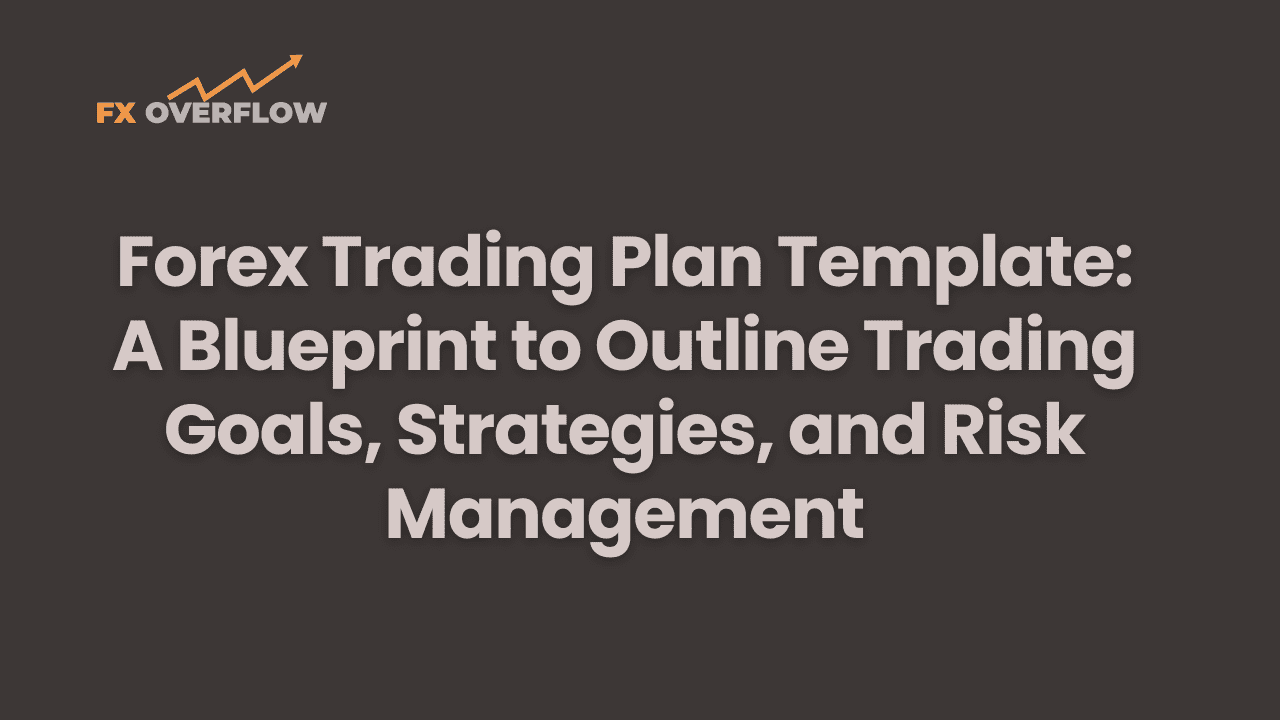Forex Trading Plan Template: A Blueprint to Outline Trading Goals, Strategies, and Risk Management
Welcome to the ultimate guide on creating a Forex trading plan template: A blueprint to outline trading goals, strategies, and risk management. If you're a forex trader looking to maximize profits, minimize risks, and achieve consistent success, you've come to the right place. A well-structured trading plan is a key foundation for any successful trader, regardless of their experience level. In this article, we will walk you through a step-by-step guide on creating a comprehensive trading plan that aligns with your objectives and risk appetite.

Forex Trading Plan Template: A Comprehensive Overview
In this section, we'll present a detailed outline of the essential components that should be included in your Forex trading plan template. Each aspect of the plan plays a crucial role in guiding your trading decisions and improving overall performance. Let's delve into the specifics:
1. Identifying Your Trading Goals
Your trading goals are the guiding stars of your journey in the forex market. They should be specific, measurable, achievable, relevant, and time-bound (SMART). This section will help you define your short-term and long-term objectives, such as profit targets, risk tolerance, and trading frequency.
2. Assessing Your Risk Appetite
Understanding your risk appetite is vital for effective risk management. In this part, you'll determine the level of risk you are comfortable with and establish risk-reward ratios for different trades. This helps in protecting your capital and preventing significant losses.
3. Selecting Suitable Trading Strategies
There are various trading strategies in the forex market, and choosing the right one is crucial for success. Here, we'll explore popular strategies like day trading, swing trading, and trend following. You'll learn to align your strategies with your goals and risk tolerance.
4. Analyzing Market Conditions
A deep understanding of market conditions is essential for making informed trading decisions. This section will introduce you to fundamental and technical analysis, enabling you to identify entry and exit points with higher probabilities of success.
5. Implementing Money Management Techniques
Money management is the backbone of successful trading. Learn how to allocate capital wisely, set stop-loss orders, and manage position sizes effectively. Proper money management ensures longevity in the market and protects you from devastating losses.
6. Developing a Trading Routine
Consistency is key in forex trading. Establishing a well-structured trading routine ensures discipline and reduces emotional trading. We'll guide you on creating a daily, weekly, and monthly routine to stay organized and focused.
7. Maintaining a Trading Journal
A trading journal is a valuable tool for tracking your progress, analyzing past trades, and identifying areas for improvement. We'll show you how to maintain a comprehensive trading journal and leverage the insights it provides.
8. Utilizing Technology and Tools
In today's digital world, technology plays a crucial role in trading success. Discover various trading tools, platforms, and indicators that can enhance your decision-making process.
9. Adapting to Changing Market Conditions
The forex market is dynamic and subject to constant change. Learn how to adapt your trading plan to accommodate shifting market conditions, ensuring your strategies remain effective.
10. Understanding Psychological Challenges
Emotional discipline is a significant determinant of success in forex trading. Understand common psychological challenges faced by traders and adopt strategies to overcome them.
11. Diversification and Correlations
Diversifying your trading portfolio and understanding correlations between currency pairs can reduce risk and improve profitability. Learn how to diversify your trades intelligently.
12. Back-testing Your Strategies
Back-testing allows you to validate your trading strategies using historical data. This section will guide you on how to backtest your strategies and make data-driven decisions.
13. Risk Management and Contingency Plans
Prepare for the unexpected by developing contingency plans for adverse market scenarios. Learn how to safeguard your capital during volatile periods.
14. Staying Updated with Economic Events
Economic events can have a significant impact on the forex market. We'll discuss the importance of staying updated with economic calendars and their influence on your trades.
15. Evaluating Performance Metrics
Regularly assess your trading performance using various metrics. This will help you identify strengths, weaknesses, and areas for improvement.
16. Seeking Mentorship and Learning
Seeking guidance from experienced traders and engaging in continuous learning is vital for refining your skills. Learn how mentorship can accelerate your progress.
17. Incorporating Trading Rules and Discipline
Establishing a set of trading rules and maintaining discipline is essential for consistent results. We'll help you create a code of conduct for your trading activities.
18. Exit Strategies and Taking Profits
Knowing when to exit a trade is as crucial as entering one. Discover effective exit strategies to maximize your profits.
19. Long-Term vs. Short-Term Trading
Explore the differences between long-term and short-term trading and decide which approach aligns with your goals.
20. Psychological Biases in Trading
Recognize common psychological biases that can impact decision-making and learn how to mitigate their effects.
21. Managing Drawdowns and Losses
Drawdowns and losses are inevitable in trading. Learn how to manage them without losing confidence.
22. Building a Support Network
Trading can be a lonely journey. Building a support network of like-minded traders can be beneficial for motivation and sharing insights.
23. Analyzing Historical Performance
Use historical performance data to identify trends, strengths, and areas for improvement in your trading strategies.
24. Stress Management for Traders
Trading can be stressful. Learn techniques to manage stress and maintain a healthy work-life balance.
25. Continuously Evolving Your Plan
As you grow and gain experience, your trading plan should evolve accordingly. Learn how to adapt and improve your plan over time.
FAQs
Q: What is the importance of a forex trading plan?
A: A forex trading plan is essential for guiding your trading decisions, managing risks, and achieving your financial goals. It provides a clear roadmap and ensures discipline in your trading activities.
Q: How do I identify my risk appetite?
A: To identify your risk appetite, assess the amount of risk you are comfortable with losing in a trade. Understand your financial situation and the level of uncertainty you can handle.
Q: Can I use the same trading plan for different financial instruments?
A: While some aspects of the trading plan may remain the same, it's essential to tailor the plan to each financial instrument's characteristics and market conditions.
Q: How often should I review and update my trading plan?
A: Regularly review your trading plan to adapt to changing market conditions, evaluate performance, and refine your strategies. Update it whenever necessary to stay effective.
Q: What should I do during periods of high market volatility?
A: During periods of high market volatility, exercise caution, and consider reducing position sizes. Stick to your risk management techniques and avoid emotional decision-making.
Q: Is it necessary to have a mentor in forex trading?
A: Having a mentor can provide valuable insights, knowledge, and guidance to accelerate your learning and trading journey. However, it is not mandatory for success.
Footnote
Congratulations! You now have a comprehensive forex trading plan template: A blueprint to outline trading goals, strategies, and risk management. By following this plan and continuously improving your skills, you'll be on your way to becoming a successful forex trader. Remember, discipline, patience, and a willingness to learn are key ingredients for achieving your financial objectives. Happy trading!











Discussion